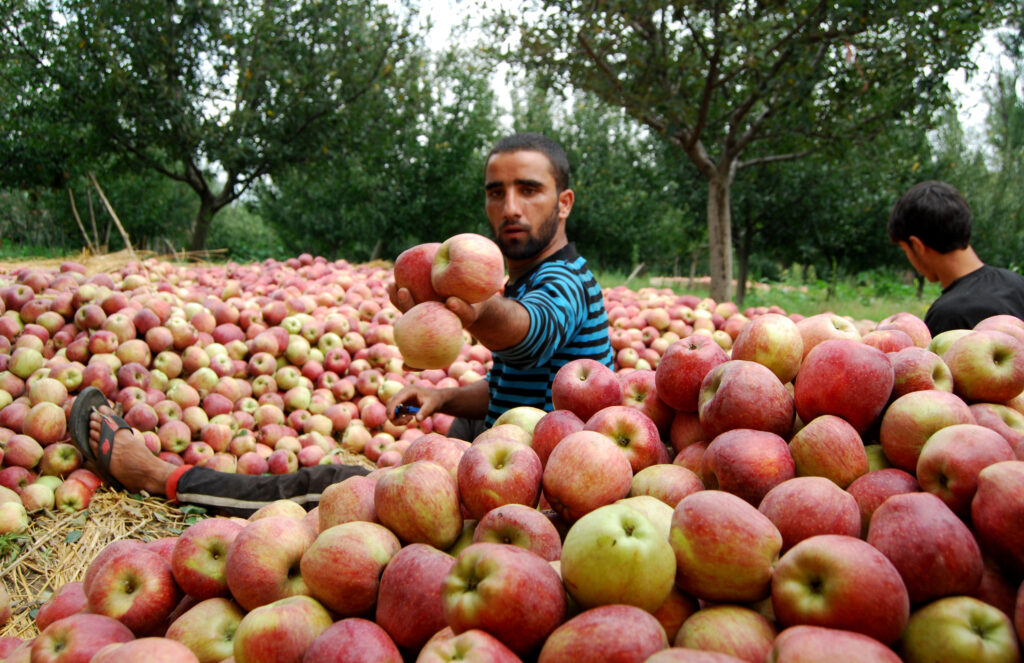Traffic blockade, freakish weather trends, spurious chemicals and an indifferent attitude of the authorities are all adding to the woes of the apple growers of Kashmir.
Firdous Parray/Basharat Akhoon
Kashmir’s precious apple industry is facing an extraordinarily turbulent phase. A slew of events, ranging from climate disasters to a recent transportation mess, is now shaping into an existential threat for the industry which has been contributing a phenomenal eight percent to Jammu and Kashmir’s gross domestic product.
The sheer size and contribution of the apple industry, which is the pivot of Kashmir’s horticulture sector, is extraordinary considering the scant revenue and employment generating sources in the Himalayan valley. Kashmir produces around two million tonnes of apple and two-thirds of this harvest is imported to markets across India and to foreign markets as well. Around 3.5 million people are directly or indirectly dependent on the apple industry for their livelihood and the fruit generates about 8,000 crore rupees in revenue. Despite these marvelous numbers, the fruit is rotting and the industry is facing a collapse.
Kashmir’s apple growers fear the apple farming may become sour for them in the coming years as market prices continue to crash and the demand has fallen following eased import rules for the fruit from Chile, New Zealand, Iran, Turkey, Italy, Brazil, Spain and the US.
“Last year we sold a box of Delicious apples in the local fruit markets in Kashmir for Rs 1000 to 1400, same box we now sell at Rs 700 to 800 and American apples now sell between Rs 450-650 this year,” said Abdul Majeed Tantary, an apple grower in his fifties, as he packed grade-A apples in his orchard in south Kashmir’s Anantnag district.
One of the best varieties and the top-selling apple, Red Delicious, was introduced to the market this year with a price difference of Rs 400-600 as compared to previous year. “I am worried about White (Kashmiri) Delicious which hasn’t yet been sold in the market. Prices will go down further and it will be a huge loss for us,” Tantary said.
“The fruit industry in Kashmir has suffered huge losses, approximately 700 crores in the ongoing month, and it will take years to overcome the losses,” said Fayaz Ahmad Malik aka Kakaji, president of Sopore Fruit Mandi, Asia’s second largest fruit mart. “We do not yet know how much we could lose, and the apple industry may eventually collapse,” he said.
Basheer Ahmad Basheer, the president of Kashmir Valley Fruit Growers cum Dealers Union (KVFGDU), said: “The fruit-laden trucks were stopped on the National Highway because of one-way traffic. They couldn’t reach the mandis outside Kashmir on time.”
He added that, this year, the Himachal and Kashmiri apples came into the market at the same time and the Kashmiri apple couldn’t compete with the colour of the Himachal apple. “This is another reason for the low rates. Kashmiri apples are juicier than those from other states. The quality of a Kashmiri apple is better than the Himachal apple, but in color, the Himachal apple is brighter,” he said
Due to an increase in crop quantity this year and traffic blockade, the apple laden trucks couldn’t reach the markets in time and many growers said the fruit had rotten by the time the trucks were allowed to move.
Basheer said the fruit-laden trucks were stopped at Qazigund for a number of days. The trucks were covered with tarpaulin, and there was high temperature and moisture. “When the fruit trucks reached the market after spending many days on the Srinagar-Jammu National Highway, the fruit had been spoiled by heat,” he said.
“However, not maintaining the grading aptly has also resulted in lower rates. This has to be taken seriously by the growers (as far as good and proper grading and packing of the apple crop is concerned),” said Basheer.
Jammu and Kashmir Lieutenant Governor Manoj Sinha said during his visit to Shopian and Pulwama on September 18, 2022 that instructions had been given to ensure that the fruit-laden trucks along the National Highway are allowed to pass on priority.
Basheer, however, said these instructions were not followed on the ground. “There was no smooth movement for the fruit laden trucks (for several more days),” he said.
Divisional Commissioner P K Pole later dismissed the allegations of fruit growers and said that the fruit-laden trucks were being halted due to natural factors. “The claim made by certain fruit growers associations on the halting of fruit trucks is half-truth and natural reasons are hindering the traffic. We have difficulties in the movement of traffic on the National Highway due to rains and shooting stones which is beyond human control,” Pole said.
The mess on the highway had forced a protest by international buyers and, on 21 September 2022, Bangladeshi buyers said they may halt the apple import. “The trucks reach Bangladesh after 15 to 20 days, and when we check the fruit there, most of it is damaged,” a buyer from Bangladesh told the media from Kashmir.
Approximately, Kashmir produced 80 percent of India’s apples and, in return, an excellent revenue would come and drive a significant portion of the region’s economy. However, as rates sharply crashed this year, the expenditure costs mounted. The cost of labour, wooden boxes, cardboard boxes, and paper has doubled in the last few years. “The price of the cardboard box was Rs 30-35 in 2021, but this year the same is sold now for Rs 45-60,” Tantary, the apple farmer, said.
A six percent increase on the GST of packaging cartons has served as a shock to the orchardists. “Wooden boxes were available at Rs 70 to 80 last year and now they are sold at Rs 100 to 120. Same is the case with the cardboard and paper boxes as the GST has been increased from 12% to 18%,” said Basheer, the KVFGDU president.
The orchardists rue that the recent transportation crisis caused them huge losses. “Due to one-way traffic, our trucks got trapped on the Srinagar-Jammu National Highway for a number of days. Trucks should have been permitted to move freely during the peak season of the year,” Maqbool Bhat, an orchardist from Anantnag district, said.
Climate Crisis
The orchardists in Kashmir have also faced huge losses due to climate change and freak weather events. Whether it is recurrent unseasonal snowfall of recent years or sweltering heat during spring months, or hailstorms, or lengthy dry spells, the apple orchards have incurred damages.
“Every year hailstorms damage crops and growers suffer sustainability. Government does nothing to make amends for that damage. For this, an insurance scheme should be accessible to the fruit growers where a common grower can survive after the damage,” said Bhat.
Mohd Amin Sultan, 62, an orchardist from the Marhama area of South Kashmir’s Anantnag district, is distraught at the destruction of his apple orchard due to the impacts of climate change. “Freakish weather conditions have also contributed to our misery. Untimely snowfall and hailstorm devastates our produce,” said Sultan.
Substandard Fertlizers and Pesticides
Sultan is also worried about the damage caused by the use of inferior fertilizers and pesticides, which has added to his financial burden.
The use of fertilisers and pesticides is of vital importance in ensuring better quality and quantity of any fruit, especially apples. To counter these challenges, orchardists demand that the use of standard pesticides should be ensured at every outlet and there should be no compromise on quality. The growers also demand that the pesticides should be inspected before being brought into the Kashmiri market and their prices should be negotiated to prevent loss.
“A number of Kashmiri fruit growers get good quality pesticides from other states like Himachal, because in Kashmir there are only substandard pesticides and fungicides available,” said Sultan.
Basheer, the KVFGDU president, said the government and the departments of Horticulture and Agriculture have made efforts during the past two years to check the substandard import of pesticides and fertilizers. There have been raids at multiple locations and legal action has been initiated against those who sell substandard products, he said. “It has not been fully successful, but it has helped,” he said.
Cold Storage
Being a perishable commodity, apples need to be quickly transported to market or stored in cold storage facilities. During traffic blockades and when market rates are cheap, growers usually store their harvest in cold storage units.
“A cold storage should be available in every village. If not in village, at least, one large unit should be at Tehsil headquarter,” said Abdul Rashid, an apple grower from South Kashmir.
There are at least 28 cold storage units across Kashmir with a capacity of 21 lakh MT, while the SIDCO Lassipora, in Pulwama district, alone possesses 18 CA units with a capacity of 70,000–80,000 MT. Cold storage units can store the apples for a maximum of 8–9 months.
“There is a fixed rate for the storage by the government, which is around Rs 1.99 per kg for a month and, for a crate, it is Rs 5 and the labour costs Rs 6,” said Malik Wajid, Director Alpine Agro Fresh Private Limited, Lassipora.
Cold stores remain the need of the hour and a unit of about 5000 MT capacity costs approximately Rs 38–40 crores. “Although we provide subsidies but despite that, the amount to invest is huge. We are trying to get more and more people in this chain, which will help in capacity building,” said Ghulam Rasool Mir, Director, Horticulture Kashmir.
Reactions
Several senior politicians have raised their voice in support of the beleaguered apple growers. Ghulam Nabi Azad, former chief minister and the head of the recently formed Democratic Azad Party, asked Lt. Governor Manoj Sinha to get involved. He also pleaded with the traffic police to remove all the restrictions and let trucks carrying fruit travel freely on the National Highway.
Mehbooba Mufti, former chief minister and President of Peoples Democratic Party (PDP), accused the government of “deliberately stopping the trucks carrying fruit, which has resulted in enormous losses.”
J&K People’s Conference senior leader and former minister Imran Raza Ansari tweeted (@imranrezaansari): “The devastation inflicted upon the fruit growers appears is a ploy by internal saboteurs within government to instigate the farmers of Kashmir. Mark my words, this will lead to economic devastation which has portends of begetting a fresh wave of violence in Kashmir.”


